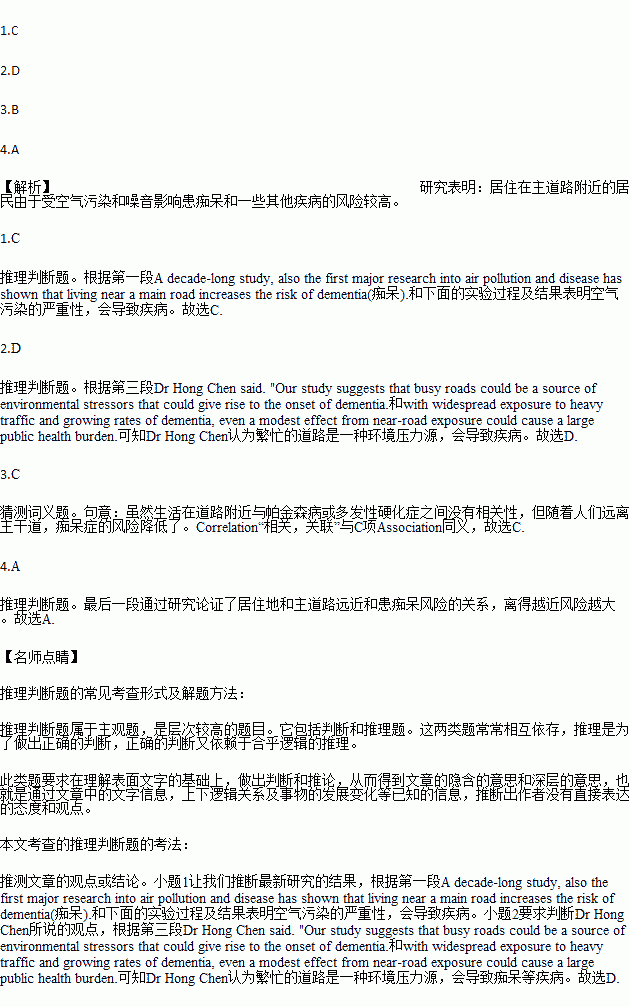题目内容
A decade-long study, also the first major research into air pollution and disease has shown that living near a main road increases the risk of dementia(痴呆). The study of 6.6 million people found that one in 10 dementia deaths in people living within 50 metres of a busy road was due to waste gas and noise.
Air pollution is already known to contribute to the deaths of around 40,000 people in Britain each year by worsening breathing and heart conditions, while previous research showed emissions (排放物) can cause brain shrinkage. But the new study by Canadian public health scientists is the first to find a link between living close to heavy traffic and the increasing of dementia, a discovery described as "believable" and "impressive" by British experts.
Dr Hong Chen said. "Our study suggests that busy roads could be a source of environmental stressors that could give rise to the onset of dementia. Population growth and urbanization has placed many people close to heavy traffic, and with widespread exposure to heavy traffic and growing rates of dementia, even a modest effect from near-road exposure could cause a large public health burden. More research to understanding this link is needed, particularly into the effects of different aspects of traffic, such as air pollutants and noise."
In the new study, the team tracked all adults aged between 20 and 85 living in Ontario for more than a decade from 2001 to 2012. They used postcodes to determine how close people lived to a main road and analyzed medical records to see if they went on to develop dementia, Parkinson's disease or multiple sclerosis(多发性硬化).
While there was no correlation between living near a road and Parkinson's disease or multiple sclerosis, dementia risk reduced as people lived further from a main road, with a 7 percent higher risk in developing dementia among those living within 50 metres; a 4 percent higher risk at 50-100 metres and a 2 percent higher risk at 101-200 metres. After 200 metres there was no increase. Researchers believe that noise of traffic may also play a role in the raised risk as well as other urban pollution, which is often present near busy roads.
1.What can we know about Canadian's new study?
A. British experts think highly of it.
B. It brings benefits to dementia patients.
C. It shows that air production is very serious.
D. It shows that air pollution can cause brain shrinkage.
2.What Dr Hong Chen said showed that______.
A. people are diagnosed with dementia mainly due to air pollution
B. widespread exposure to traffic will reduce the risk of having dementia
C. the link between living near roads and having dementia was not obvious
D. busy roads could be a source of environmental stressors that caused dementia to increase
3.What does the underlined the word ‘correlation’ mean?
A. Change. B. Improvement.
C. Association. D. Secret
4.What can be inferred from the last paragraph?
A. Living near a main road adds to the risk of noise.
B. Living beyond 300 metres of a main road is safe for people.
C. Living within 200 metres of a main road has a lower risk of having dementia.
D. The further people live away from heavy traffic, the smaller the risk of having dementia.
 数学奥赛暑假天天练南京大学出版社系列答案
数学奥赛暑假天天练南京大学出版社系列答案 南大教辅抢先起跑暑假衔接教程南京大学出版社系列答案
南大教辅抢先起跑暑假衔接教程南京大学出版社系列答案Memorandum(备忘录) To: Members of all departments From: Annette Derringer Subject: Year-end party Date: November 26 |
This is just a quick note to let you all know the arrangements for next month’s year-end party. As you know, the party will be held at the Green Vale Country Club, which we have reserved between 6:00 pm and 10:00 pm on the evening of December 21st. 1 have received replies from almost all of you confirming attendance, but if you have not let me know yet, please do so in the next day or two. Tickets for all employees have been covered by the company. The manager of Green Vale has asked me to explain one or two things to those of you who have not been there before. Basically, there is enough parking space for only 100 vehicles, so he would like to ask those of you planning to drive to try car pool(拼车)as much as possible. Also, the number of lockers available is small, so guests should try to keep belongings to a ,minimum. Thanks in advance, Annette |
To: Annette Derringer aderringer@belway.com From: Kype Berwick Subject: Year-end party Date: November 28 |
Annette, I will be able to attend the year-end party at the Green Vale Country Club on December 21st although I do not think I will be able to arrive before 7:30. I was wondering if it would also be possible to bring a couple of guests. I know it is a bit of a last-minute request, but my brother and his wife are planning to visit us at that time, and they would love to see the Green Vale. If it is not a problem, then could you let me know how much I should pay for their tickets? Also, assuming this is OK, we are planning to drive down in a single car to reduce the need for paring and also to allow us to keep our belongings in the ear. I will have a couple of days off before the party, and I will not be in my office December 17th, so could you get back to me before then? Thanks a lot, Kyle |
1.Which of the following is NOT mentioned in the memorandum?
A. Payments for extra guests.
B. Time of the year-end party
C. Parking restrictions.
D. Storage of personal items.
2.Kyle Berwick writes to Annette Derringer mainly to____.
A. ask the price of movie tickets
B. explain why he cannot to the party
C. confirm the route to the hotel.
D. ask if he can bring guests to the party.
3.What can we infer from the passage?
A. The manager of the Green Vale doesn’t want the members to go there by car.
B. Annette is in charge of making arrangements for the year-end party.
C. The members can take as many belongings as they can with them.
D. Kype Berwick won’t bring guests to the party if he as to pay for the tickets.


 y what they cannot ______. So far I've witnessed acts of cruelty against those who are ______ on a daily basis. Ryan is a prime ______ of how people who may be different are still as worthy as others. Since his diagnosis, I have ______ judging people and tried to get others around me to do the same. Ryan would never ______ somebody because he doesn't like the way he/she looks or dresses. He welcomes all people into his life, and I ______ myself because I have learned to do the same.
y what they cannot ______. So far I've witnessed acts of cruelty against those who are ______ on a daily basis. Ryan is a prime ______ of how people who may be different are still as worthy as others. Since his diagnosis, I have ______ judging people and tried to get others around me to do the same. Ryan would never ______ somebody because he doesn't like the way he/she looks or dresses. He welcomes all people into his life, and I ______ myself because I have learned to do the same.